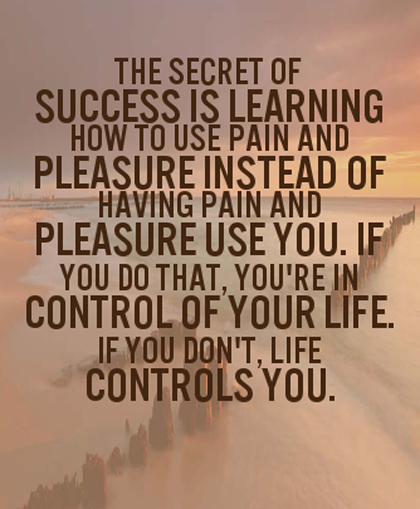Resistance To Change Is A Natural Response
Anytime you want to create something different or something greater than what you have, resistance to change tends to come up.
Whenever change or transformation is required, there's bound to be some resistance to that change.
Sometimes the resistance to change is big and obvious, and sometimes it's subtle and unnoticeable. But it does come up. That's a fact of life.
Why Resistance To Change Comes Up
Resistance to change comes up as a natural biological response as the brain attempts to hold onto what it “knows is safe”. Biologically we are all hardwired to need certainty or security. Certainty, like it or not, is gained from staying in the same place and not changing a thing. Why would you want to leave the “cave” that is the safest place for you to hide from all those dangerous animals, right?
Problems arise though, when people unconsciously resist changing habits they know are limiting and destructive.
Here's why resistance to change happens.
At a biological level, what they call the reptilian brain, is the part that is responsible for the human “fight or flight” response. Basically the question it asks is, “will I get eaten, or will I eat it?” The reptilian brain is functioning purely in the interest of survival. Anything that it perceives as a threat to its survival, it will naturally resist, avoid, or want to eliminate.
Make sense so far?
Here's the real kicker!
The reptilian brain doesn't do a good job at differentiating between “real” and “imagined threats”. Any change that could be perceived as a threat or, something that could cause fear or stress will cause alarm bells to go off. Therefore in an attempt to keep you safe and secure, resistance to change is triggered.
Welcome Resistance To Change!
Just look at your muscles for example. If you want to strengthen your muscles, they need to be subjected to a reasonable amount of weight or load. Your muscles will resist the weight or work against it. That's part of the natural process of building stronger muscles. When your muscles begin to work with that resistance, two things happen:
- Your muscles send a signal to your brain to help identify the “current boundaries of possibility”.
- Your muscles fibers are “stretched and contracted” (sometimes painfully) and tiny muscle fibers actually do break! In other words, your muscle fibers exceed the boundaries of their comfort zone.
Both those things MUST happen, and then the muscle fibers need to heal in order for your muscles to get stronger!
No muscle can get stronger without resistance being applied to it in the first place.
Without the resistance coming up, your brain doesn't get to clearly identify what the boundary is.
And if all that uncomfortable (and sometimes painful) stretching and contracting, along with the breaking of tiny muscle fibers doesn't happen, your muscles don't get to repair with stronger tissue this time. In other words, they don't rebuild stronger.
How To Overcome Resistance To Change
Here are 3 ways you can overcome resistance to change:
1) Stop focusing on the pain. Start focusing on the pleasure you'll gain.
People resist change because they want things to stay the same and be easy. They tend to avoid anything that is perceived as painful or challenging (like hard work). Those people are focused on how to avoid “pain”.
If you want greater success in life, your focus must be different. Why? Because pain, problems and challenges are unavoidable in life. You already know that. If you keep focusing on the pain or discomfort you'll experience by making the change, you'll never feel motivated to make the change!
You need to begin focusing on the end result. Focus on what you'll experience once you've achieved the success you want. That's where the pleasure is.
Pain and pleasure are the invisible forces that shape your actions and therefore your life.

2) Ask better questions.
If you find yourself resisting change you know will be good for you, stop what you're doing and ask better questions. Questions like these:
What's really going on?
What am I really resisting?
What am I perceiving the threat if I were to make this change?
Is this threat real or imagined?
What am I afraid I'll lose if I make this change?
Will breaking through this resistance eventually be good for me, good for others, and good for the greater good?
If I stepped up and actually the change required, will it help me achieve my goals sooner?
If I keep resisting the change instead of using it as a vehicle to step up higher, how much longer will I have to put up with a life of not having what I truly want?
Is this “good resistance” or is it “limiting resistance”?
These are just a few questions that shift the “decision making authority” back into the hands of the intellectual “human” part of your brain. By doing that, you'll be able to see and understand with greater clarity, and then take action as necessary.
3) Prepare yourself gradually for the bigger challenges or goals.
Bigger challenges and goals tend to bring with them bigger changes that would need to be made. Challenge yourself gradually.
Let's the gym metaphor again. You wouldn't go to the gym for the very first time and try to lift 50kg right away would you? You'd obviously begin with a lighter weight goal, and gradually build your muscles up. You wouldn't want to lift a weight that is too light that your muscles don't feel any resistance at all. Why? Because you want to give your muscles “enough” resistance to work with, but at the same time, you'd want to build your strength up in a way that is sustainable long term (which means, without getting injured).
Likewise, when setting targets or goals to achieve, set milestones along the way that would help you grow gradually without getting burnt out, injured nor discouraged.
You could ask yourself this question:
“What kind of challenges can I take on now, up front, to prepare and strengthen my mind and body for the bigger challenge later?“
Conclusion
You see, it doesn't matter where or how the resistance to change shows up. It doesn't matter if resistance to change is from an external source like weights, or internal source like your old limiting beliefs.
All that matters, and that you must remember is that, resistance to change is a natural part of the process to evolve yourself. But, you must evolve past that resistance before you can get stronger and better!
Human qualities like persistence, determination, perseverance, and taking action, are all “muscles” that need to be strengthened too. They are the “muscles” you need in order to achieve your goals and success.
“What you don't use and strengthen, you lose.”
“Choose to challenge yourself now, and expect resistance to show up. When resistance shows up, because you've already anticipated it, welcome it and use that resistance to breakthrough to the next level. Keep doing that over and over, and you'll be unstoppable!”
Embrace the process fully. Embrace the fear. Give yourself to the process fully. Invest and commit to the process fully.
By embracing the process and committing to it fully, you get results faster. People that don't, use up so much energy trying to resist change. They invest so much energy trying to stay the same. Instead, they could use that same amount of energy to grow through the resistance.
There are times to protect yourself, your ideas, beliefs, values and how you usually do things.
But you must ask yourself, “Is this is one of those times?” Or, “Is this the time to do what needs to be done, to breakthrough and create the life of my dreams?”
